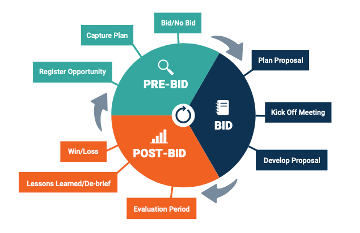Whitepaper #1
How automation is redefining the bid management process
Bid management is now a mature enterprise sales practice that involves dedicated resources and many technical experts to win and retain critical supply contracts in a growing outsourcing environment. As the automation of knowledge work advances, organisations will need to evaluate and choose a platform that delivers both longer term organisational value and competitive advantage.
The changing procurement landscape
Competitive tendering and bidding is a trillion-dollar industry that crosses every sector, and virtually every service type. From procurement of office supplies to major infrastructure, the industry is best described as a two-sided business-to-business marketplace whereby an enterprise sales search and selection process takes place for the procurement of high value goods and services.
The process is usually a longer sales cycle involving the release of complex documentation by the procurement organisation through a Request for Tender (RFT). Suppliers compete at arm’s length with written submissions that address a range of price and non-price criteria, with contract negotiation, and ultimately the contract, awarded to the preferred compliant supplier(s) with the highest evaluation weighting.
Bidding is now the most preferred procurement method among government and publicly listed entities worldwide, and a compliant and winning tender or bid is essential for the survival of many businesses. This has resulted in more than 18.5 million public bids released globally each year, excluding commercial and invitation only (or closed) bids.

Published bid opportunities are growing eight per cent year on year, with public outsourcing spending around 15 per cent of a country’s GDP. This has been spurred on by growing corporate governance and procurement reform, and the shift by many governments away from the provision of direct service delivery to the outsourcing of public services to industry.
Winning a major contract through open competitive bid can significantly boost organisational growth and profit by creating a pipeline of work and job security. In many countries, it is now mandated to ensure minority groups and small businesses are also represented in a contractor’s supply chain. And with growing global corporate governance, accountability and probity, it is a trend that is continuing to rise exponentially.
Bid management takes center stage
Today, procurement organisations expect far less subjective spin and more solutions-oriented approaches. On a business level, bidding activity provides great insight into the health of the economy, the strategic intent of organisations (and sectors generally) and the associated supply-chain business opportunities and regulatory responsibilities that are likely to flow from the contract.
On the supply-side, it is often the role of the business development team, or more specifically, the Bid Manager, to manage the RFT process internally. They are responsible for ensuring that the proposed solution and broader due diligence documentation is compliant, compelling and competitive. The ultimate aim is to be the most preferred – and often the least ‘at risk’ supplier, thereby proceeding to contract negotiation and award.
Bid management is the overarching end-to-end process that begins with capture planning to transition a sales opportunity to bid; and eventually handover to the contract implementation team. This involves opportunity identification (sometimes in consultation with sales; other times through direct alert of a bid opportunity); solution discovery, pricing strategy, development of competitive win themes within the submission, along with contract and compliance documentation.
Preparing a tender or bid submission involves strategic input and written contributions from many stakeholders from within and outside the organisation, often within compressed timeframes. Throughout the process there will be internal checkpoints and decision gates to manage; external question and answer periods, and potentially multiple addendums issued from the procurement side that need to be acknowledged, tracked and registered.
Done right, preparing ahead for tenders and bids not only saves time – it also helps to formalise quality systems, reporting and risk management processes. Importantly, it assists executive and operational management to collaborate and analyse their collective knowledge and experience, and identify customer service improvements and other sources of competitive advantage.
Organisations seeking to embrace a more mature bid management process must therefore transition from traditional ways of managing their bid teams by bringing the Bid Manager’s role – and that of the many contributors across the enterprise – to the highest level of governance.
Automation streamlines process and improves productivity
Early solutions in the bid management sphere facilitated file sharing and document collaboration while next-level publishing tools helped to fast-track the production process. Project and document management solutions featured more streamlined collaboration processes, with niche providers emerging to deliver proposal automation, workflow and re-use of content.
Proving that content management and document creation are critical technology supporters in the bid and sales proposal process, platforms have now begun to integrate with social enterprise apps and CRMs. While early days, aggregators that stream content to a platform to provide a single source of truth are beginning to emerge as product enhancements; possibly as a precursor to machine learning.
Bid management is not fully supported
While content and document management itself is a high value and time-consuming part of bid management, it is only a partial component to enable the full bid management lifecycle.
Tender and bid management is widely acknowledged as being a cumbersome and highly manual process – however, it is far from being merely a document collation exercise. Smart, mature bid management is a strategic function that combines a mix of project management, business development and domain expertise requiring regulatory, legal, financial and marketing nous.
Quality tender and bid planning and preparation brings together previous organisational knowledge and new strategic insight into a unified and compliant selling document that conveys the unique selling proposition and backs it up with evidence. It is this complexity and multi-disciplined approach that makes the process often overwhelming and poorly executed.
Bid management is now a maturing profession that requires its own centralized system to manage all the data and parties related to the bid process – much like sales, finance and human resources have been afforded with Salesforce and SAP. Managing the bidding process can become unruly if there is no centralized system to store, track and manage relationships, knowledge and contributions. With the exception of systems purpose-built for complex industry vertical processes, most bid management solutions have so far focused mainly on proposal creation – a narrow sub-set of the broader bid management function.
The problem with current automation platforms for the bid team is that they are either generic, one-size-fits-most solutions, or are singularly or partly geared for content, document and project management. With industry solutions heavily skewed towards creating process efficiencies, there are few holistic solutions that serve to build professional capability.
Building capability: The Bidhive framework for best practice
Quite often, companies struggle to get shortlisted due to non-compliance or they simply forego the tender or bidding opportunity due to lack of capability, resources or understanding of how to navigate the process. Bidhive is a single cloud-based Software as a Service solution developed in response to the first-hand pain point experienced by our founder who has more than 25 years’ experience in tender and bid consulting internationally, and across sectors. The platform solves common problems around having the right processes and tools that help bid teams proactively plan for, and respond to, new business opportunities.

Above: The Bidhive platform supports the business development lifecycle and aligns to industry best practice frameworks and standards.
The platform builds on a proven framework for tender and bid success, and aligns to the global best practice UK National Occupational Standards (NOS) for bidding and tendering. Unlike other platforms that simply host content and enable workflow, Bidhive supports an organisation’s ability to evaluate a bid opportunity and streamline the bid process starting with strategy, quality and compliance even before the submission process begins. Contributors are guided from the planning and development stages through to post-submission analysis, with full dashboard visibility providing status and performance insight at the bid, team and organisational levels.
In the new corporate governance environment, organisations that value and adopt best practice bid management processes through capability-building and productivity tools will be the ones to survive and thrive. Bidhive is changing the way business users approach and interact with enterprise knowledge and data to deliver greater organisational value – making it the essential platform for bid teams wherever they are located.
